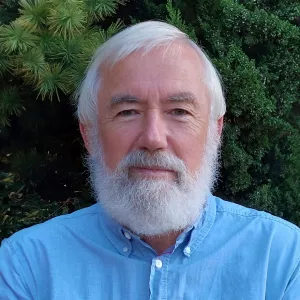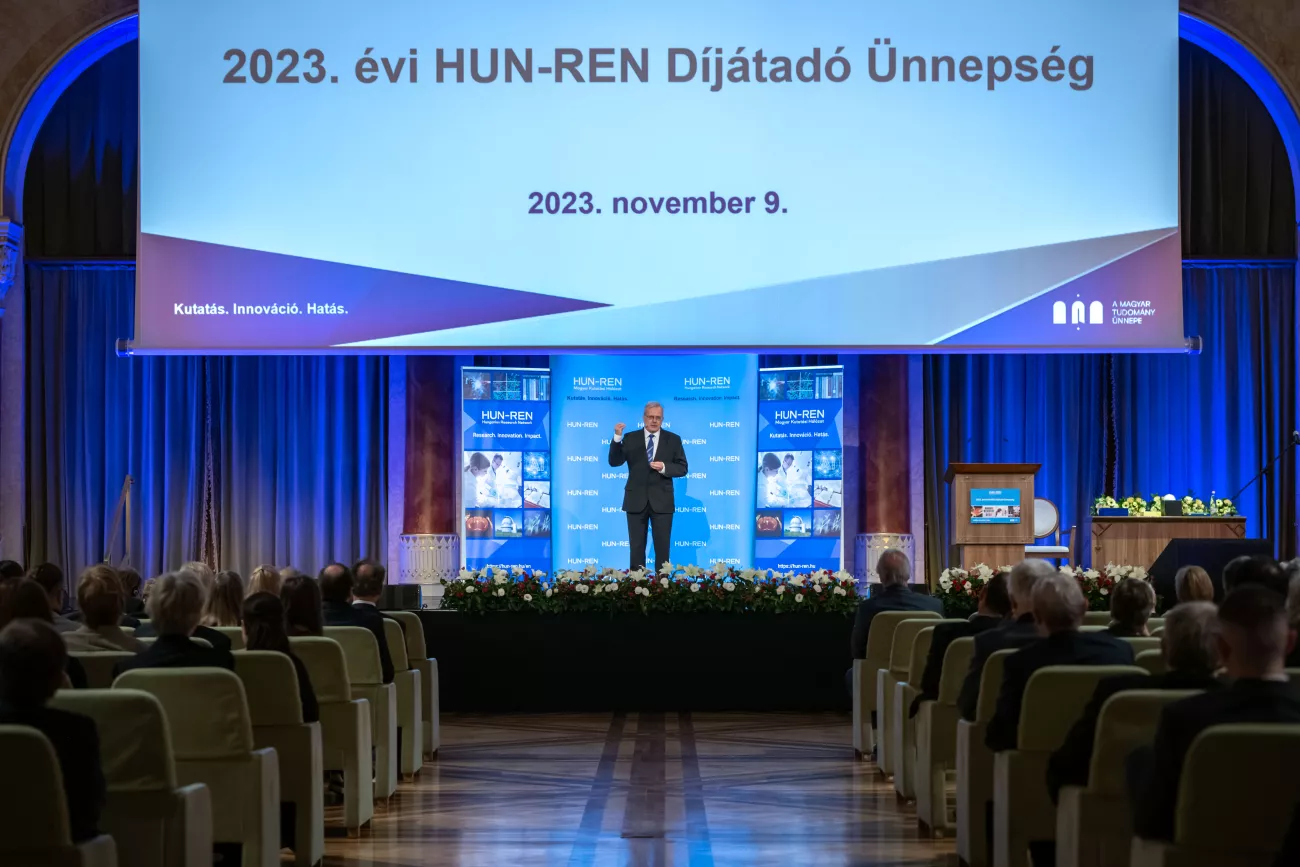Fifteen pre-eminent researchers from the Hungarian Research Network (HUN-REN) were honoured with scientific awards at the 2023 HUN-REN Award Ceremony. The HUN-REN Secretariat established the HUN-REN Excellence Award (formerly known as the Eötvös Loránd Research Network Prize) and the Róbert Bárány Award for young researchers in 2021 to recognise outstanding academic performance within the network. In addition, the distribution of the Research Professor Emeritus title has also been launched. The 2023 Award Ceremony and accompanying scientific conference took place at the Pesti Vigadó on November 9.
In his welcoming address, President Balázs Gulyás emphasised that HUN-REN and Hungarian researchers occupy a central role within a multidimensional alliance framework. The first dimension is the past-present-future time continuum. He articulated, "We, Hungarian researchers, must safeguard the entirety of our scientific heritage while concurrently advancing it to meet 21st-century standards. We must put into practical use the exceptional outcomes achieved by our predecessors and pass them on to the next generations." Secondly, he mentioned the role that researchers play between science and society. He noted, “We must not only translate the results of science but also integrate them into the value chain and convey them to members of society.” As a third dimension, he identified the internal alliance among researchers. 'We are working to create value so that the results of our efforts, through the research-innovation-impact value chain, reach the Hungarian citizens who support us. They should perceive improvements in their quality of life and health, witness economic growth, and see our cultural traditions and intellectual life flourishing." In conclusion, President Gulyás extended his congratulations to the awardees and conveyed his gratitude to both them and the entire HUN-REN researcher community for their contributions in fostering value.
Johann-Dietrich Wörner, Professor and former President of the European Space Agency (ESA), as well as the President of Acatech (National Academy of Science and Engineering) in Germany, in his welcome speech also highlighted the importance of integrating and utilising research and innovation results within the value chain.
This year, the great-granddaughters of the Nobel laureate Róbert Bárány travelled to Budapest for the award ceremony. Sigrid Marie Barany came from Sweden, and Ebba Louise Barany arrived from Luxembourg to personally participate in the presentation of the Róbert Bárány Awards.
During the event, world-acclaimed French neuroscientist Professor Jean-Pierre Changeux presented a lecture on “The Brain as a Chemical Machine”. Following the award ceremony, Éva Kondorosi, research professor at the HUN-REN Biological Research Centre in Szeged, and this year's recipient of the HUN-REN Excellence Award, shared insights through her talk on “Biological Nitrogen Fixation: A Path Towards a Sustainable Future”.
HUN-REN Excellence Award
The purpose of establishing and bestowing the HUN-REN Excellence Award is to extend moral and financial recognition primarily to researchers within the network for their outstanding professional work. The award is presented annually to a researcher who enjoys widespread appreciation in the scientific community both domestically and internationally, boasts a distinguished career, remarkable scientific accomplishments, and notable research results or patents.

Recipient of the HUN-REN Excellence Award in 2023
Éva Kondorosi
HUN-REN Biological Research Centre, Szeged
Éva Kondorosi is a Széchenyi, Balzan and Prima Primissima Prize-winning biologist and a full member of the Hungarian Academy of Sciences (MTA). She began her research career at the MTA Research Centre for Biology in Szeged, and from 1989 to 2013 she served as the Science Director of the CNRS Institute of Plant Sciences in France. In 2007, she founded the BAYGEN Institute in Szeged based on French-Hungarian research collaborations, which was integrated into the MTA Biological Research Centre (BRC) in 2012. Currently, she is a research professor at the HUN-REN BRC.
Her primary research field is the symbiosis between Rhizobium bacteria and legumes, resulting in the formation of nitrogen-fixing root nodules, allowing plants to grow without external nitrogen sources. This specialised research field has led to numerous discoveries of general significance that are essential for environmentally friendly, sustainable agriculture, and food security. The focus of her current research is on increasing nitrogen fixation efficiency and understanding the functions of hundreds of plant peptides produced in symbiotic cells, several of which are promising new antibiotic candidates. The research group led by Éva Kondorosi is one of the leading international hubs for plant molecular biology, chemical ecology, and symbiosis research.
For her groundbreaking discoveries that challenged prevailing dogmas, she has been elected to numerous prestigious academies, including the National Academy of Sciences of the USA, the Academia Europaea, Leopoldina, and the French Academy of Agriculture. Owing to her esteemed reputation in the scientific community, she was chosen as a member of both the UN Secretary-General's Scientific Advisory Board and the European Commission’s Group of Chief Scientific Advisors. She has served as Vice President of the European Research Council (ERC), and in her capacity as Chair of the Life Sciences Class of the Academia Europaea, she plays a pivotal role in drafting evidence-based science policy recommendations.
Research Professor Emeritus title
The purpose of establishing and bestowing the title of Research Professor Emeritus is to recognise the successful research career of HUN-REN researchers, as well as their significant contributions in the field of science organisation.
In 2023 the title of Research Professor Emeritus was presented to:

Attila Bóta
HUN-REN Research Centre for Natural Sciences
Attila Bóta is a Doctor of the Hungarian Academy of Sciences (MTA) and a university private lecturer at the Budapest University of Technology and Economics, he has previously been teaching physical chemistry for thirty years. Throughout the several decades of his significant scientific career, he has achieved outstanding results in various fields, including colloid chemistry and biophysical chemistry, particularly in the development of active ingredient delivery nanosystems. He has played a pioneering role in the domestic application and development of small-angle X-ray scattering (SAXS) measurement technique. Under his leadership, a unique and custom-designed SAXS instrument was constructed at the HUN-REN Research Centre for Natural Sciences, providing significant infrastructure for both national and international research projects. The Biological Nanochemistry Research Group he established in 2009 aims to bridge traditional colloid chemistry with the new challenges emerging in the fields of biology and medicine.

Balázs Harrach
HUN-REN Veterinary Medical Research Institute
Balázs Harrach is a full member of the Hungarian Academy of Sciences, a titular university professor and an emeritus core member of the Doctoral School of the University of Veterinary Medicine Budapest, former director of the HUN-REN Veterinary Medical Research Institute. He is a pioneering figure in the development of the veterinary molecular virology in Hungary. His group discovered numerous new adenoviruses and other DNA viruses. Through studying the evolution of adenoviruses, they clarified the genetic relationships within the virus family, which is presently divided into six genera. As EC member of the ICTV, he participated in the recent renewal of virus taxonomy and nomenclature, during which the virus species were defined precisely, and higher taxon levels were introduced.

Ferenc Iglói
HUN-REN Wigner Research Centre for Physics
Ferenc Iglói is a physicist awarded with the Széchenyi Prize, a Doctor of Physical Sciences, and a university professor. He is the scientific advisor of the Research Institute for Solid State Physics and Optics at the HUN-REN Wigner Research Centre for Physics. He has been working at the Institute and its predecessors since 1977. His primary research area focuses on the statistical physical investigation of the collective behaviour of many-body systems using theoretical and computational methods. He conducts his research in extensive domestic and international collaborations. He has achieved outstanding results in describing the properties of phase transitions of the order-disorder type in classical, quantum, and non-equilibrium systems. Thanks to his exemplary school-creating activity, an excellent statistical physics group was established at the HUN-REN Wigner Research Centre for Physics and the University of Szeged.

Miklós Tegze
HUN-REN Wigner Research Centre for
Physics
Miklós Tegze is a physicist awarded with the Széchenyi Prize, a Doctor of the Hungarian Academy of Sciences, and a candidate of physical sciences. He is the scientific advisor of the Research Institute for Solid State Physics and Optics at the HUN-REN Wigner Research Centre for Physics. His primary research area focuses on determining the atomic-level structures of crystalline and amorphous materials, as well as biological molecules, using X-ray diffraction methods. Within this field, he has achieved outstanding international results in the research of fullerenes, as well as in the development and application of X-ray scattering techniques. He and his colleagues were the first to detect the crystalline polymerization of C60 molecules. He participated in the development of atomic resolution X-ray holography. Currently, he is engaged in the application of X-ray free-electron lasers (XFEL) for atomic-level structural research.

Szabina Török
HUN-REN Centre for Energy Research
Szabina Török is a physicist, Doctor of the Hungarian Academy of Sciences. She has achieved outstanding results in the field of environmental monitoring and radioactive waste on an international level. She was for more than four decades active in HUN-REN Centre for Energy Research and as the head of the Environmental Laboratory, initiated original new research projects. As a supervisor of doctoral schools, she plays a significant role in nurturing young talent. As a founding member of the Doctoral School of Environmental Sciences at ELTE she was promotor of five PhDs. She is chair of the target collaboration board of the European Spallation Source (Lund), and work package leader for the construction of remote handling equipment that will remove the highly radioactive equipment.
Róbert Bárány Award
The Róbert Bárány Award was instituted to honour exceptional scientific work by HUN-REN researchers aged below 40. In selecting awardees, not only the results attained are considered but also the innovative nature of the scientific work, its inherent potential, and prospects for future advancements, including participation in diverse projects and engagement in international collaborations. For female researchers with children below 14 years, the age criterion for eligibility is increased by two years for each child, capped at a total extension of four years.
2023 winners of the Róbert Bárány Award:
Mathematics and natural sciences
Gábor Piszter investigates the photonic nanostructures present on the wings of blue butterflies using materials science methods and characterizes the properties of the resulting structural colors through optical spectroscopy. His most significant achievement is uncovering the connection between structural colours, nanostructural properties, and their biological function and genetic characteristics. This discovery finds utility in the application of butterfly wing nanostructures as gas and vapor sensors, as well as substrates for photocatalysis. His expertise in the comprehensive optical characterization of photonic nanostructures has also proven successful in other areas of materials science, as demonstrated by his recent publication with his colleagues in the journal Nature Nanotechnology.

Gábor Tóth
HUN-REN Research Centre for Natural Sciences
The aim of Gábor Tóth's research is the molecular characterization of tumor-related alterations in the glycosaminoglycan (GAGs) profile of human tissues through mass spectrometry analysis. He has developed a comprehensive workflow for the instrumental analysis of tissue GAGs. His research findings may contribute to understanding cancerous malfunctions such as chronic liver diseases and prostate cancer, thus facilitating the discovery of new therapeutic targets. The established methodologies are being applied in various ongoing projects to decipher the signalling functions of glycosaminoglycan chains.
Life sciences

László Imre Dobson
HUN-REN Research Centre for Natural Sciences
In the past 8 years, László Imre Dobson has investigated transmembrane proteins associated with various diseases using biophysical and AI-based methods. His most significant achievement is the development of a topology prediction method capable of estimating which segments embed into the membrane and indicating the positions of intermediate regions relative to the membrane. The program based on the Consensus Constrained TOPology (CCTOP) procedure, which he developed, has been applied in numerous of his studies and is regularly used by the scientific community. Thanks to his results, he has won several international grants and worked at the European Molecular Biology Laboratory as a Marie Curie fellow for 2 years, where he investigated proteins facilitating Leishmania infection.

Ádám Lovas-Kiss
HUN-REN Centre for Ecological Research
Ádám Lovas-Kiss has achieved significant results in the field of dispersal biology, particularly in the investigation of the role of waterfowl in the dispersal of various organisms. Through his research, he has demonstrated that the propagative and dispersal structures of multiple plant and animal species maintain their viability as they pass through the digestive tract of waterfowl, allowing them to travel even over distances of several hundred kilometres. This plays a significant role in the spread of non-native species and the adaptation of organisms to changing climates and their migration. He is collaborating with several international research groups, his publication performance stands out among his peers of similar age within Hungary.

Kinga Mészáros-Molnár
HUN-REN Biological Research Centre, Szeged
In their recent publication Kinga Mészáros-Molnár, together with her colleagues, has confirmed that astrocytes contribute to breast cancer progression in the brain through activation of inflammatory pathways. In another study, featured on the cover of the prestigious journal Molecular Oncology, they were the first to describe the powerful pro-metastatic effect of brain pericytes. Thus, they described such pathways that may become a novel strategy in controlling brain metastatic diseases. Kinga Mészáros-Molnár has received numerous accolades, winning the New National Excellence Scholarship multiple times, and her scientific work has also been recognized with the Junior Prima Award.
Social sciences and the humanities

Márton Bene
HUN-REN Centre for Social Sciences
Márton Bene is studying the transformation of political communication driven by social media. One central element of this is the phenomenon he calls "political communication viralisation," which is the topic of his numerous international and domestic studies, as well as a Hungarian monograph. The aim of his research is to uncover the consequences of political viralisation, primarily by examining which political contents on social platforms citizens are receptive to. He presents his outstanding results through presentations at domestic and foreign conferences, as well as prestigious international publications. His research is of fundamental importance and is frequently referenced in the exploration of the political and democratic implications of contemporary political processes.

Gergő Tóth
HUN-REN Centre for Economic and Regional Studies
Gergő Tóth's research, which combines the methods of network analysis and econometrics, focuses on causal relationships. He is a founding member of one of the most dynamically developing research groups at the HUN-REN Centre for Economic and Regional Studies. He has co-authored six publications with the group's leader, Balázs Lengyel, in international journals, and they are also collaborating on several pioneering studies related to spatial social networks. A significant scientific achievement is their first-author study that exclusively utilizes Hungarian data to demonstrate the universal social phenomenon of social fragmentation, which was published in the prestigious journal Nature Communications.

Réka Tímea Újlaki-Nagy
HUN-REN Research Centre for the Humanities
The topic of Réka Újlaki-Nagy's English-language monograph "Christians or Jews? Early Transylvanian Sabbatarianism (1580–1621)" published last year focuses on an exciting segment of the Transylvanian Reformation and 16-17th century Transylvanian intellectual history: the early period of Székely Sabbatarianism. Through her source-research work, she has made numerous manuscripts from the 16th to 19th centuries accessible, allowing us to gain a better understanding of the religious life and thinking of the Sabbatarians. Her monograph is a foundational work for researchers in the field of Reformation and interfaith relations. The book was published in the well-known Refo500 series of one of the oldest-standing German academic publisher Vandenhoeck & Ruprecht, making it available in libraries and institutions worldwide.
.


